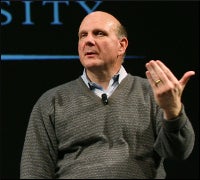 |
| Microsoft CEO Steve Ballmer addresses an audience last night at Stanford University. Source: Microsoft |
PALO ALTO, Calif. — Steve Ballmer never got around to finishing his graduate work at Stanford’s business school, leaving after a year to join his pal Bill Gates at then-startup Microsoft.
That was 29 years ago, and you’d have to say things turned all right for him.
On Wednesday, the billionaire CEO of Microsoft (NASDAQ: MSFT) revisited the campus as an invited guest of the university’s Entrepreneurial Thought Leaders seminar series. Some tech gossip sites had speculated that Ballmer arrived earlier in the week to pursue talks with Yahoo (NASDAQ: YHOO) about a search partnership deal.
But Ballmer was quick to put such talk to rest, saying he was here for the speech and to meet with some interns at the Stanford Graduate School of Business.
Still, at least a portion of the talk centered on Yahoo, and Microsoft’s efforts to spend its way into better search.
“It was a long saga, but I’m glad we went down that road,” Ballmer said of Microsoft’s failed attempts to buy the Web portal. “At the end of the day, it would have been valuable. I think there still exists opportunities to create a better search product with more customers. That may or may not at some point happen, but I don’t choose to comment.”
Whether a deal comes to fruition, Ballmer made it clear Microsoft is willing to try new things to succeed in search — and that it might even have more flexibility in that regard compared to the dominant search player, Google (NASDAQ: GOOG).
“No. 1 is a lot bigger than us and bigger than No. 2,” said Ballmer, a nod to Microsoft’s third-place position in search, with a single-digit market share behind both Yahoo and Google.
“We’re more like a startup in the search market,” he said. “We can’t invest in everything. We can’t outdo and outspend. But there are things we can do because we’re not the market leader, like experiment with new business models like cash back. And we’re not locked in to the current user interface. We have the luxury and flexibility to try new things.”
Yet he said there were certain areas that Microsoft “absolutely has to invest in,” including natural language (which it’s already done with last year’s purchase of Powerset) and voice.
“There will be a cost to entry, but we have to be disruptive in how the business model works,” he said, adding Microsoft can afford to take some chances. “We have less revenue and less to lose than the market leader.”
Of course, Microsoft is hardly a startup — the company spends $9 billion a year on R&D — but Ballmer strove to paint it as the plucky, underdog competitor in search.
“That was smooth,” Tom Byers, a professor and director of the Stanford Technology Ventures Program, told InternetNews.com after the event.
Coming soon: Three Screens and a Cloud
While Microsoft’s track record in search hasn’t been a standout, Ballmer defended the company when one audience member implied in a question that Microsoft hasn’t been innovative.
“We’ve done a lot of innovation … In the last five years, Xbox Live has been the most interesting entertainment thing out there,” he said. “And in the business space, SharePoint has gone from nothing to over a billion dollars in five years. It’s not a consumer, sexy product. Or you can look at the latest version of Microsoft Office and discoverability and the changes in the UI. It’s quite big.”
But Ballmer also noted other companies have innovated as well, giving kudos to Apple (NASDAQ: AAPL) for the iPhone, and to Facebook, in which Microsoft is an investor, for social networking.
He also described areas beyond search where Microsoft is concentrating heavily today. In particular, he recalled the old movie “Three Men and a Baby” to describe where computing is headed, and where Microsoft aims to play.
“The world is now ‘three screens and a cloud’ — phones, TVs, PCs and the cloud,” he said. “Our basic business is providing computing platforms. Windows Azure is the backbone of our cloud strategy and super important to us.”
Bad times are the best
Over a thousand people filled the lecture hall and greeted Ballmer a with a big ovation. Though the event was open to all students, a quick show of hands showed that most of the attendees were from Stanford’s School of Engineering, which seemed fine with Microsoft’s head honcho.
“[email protected] — we’re always hiring,” he told the students.
For most of the discussion, Ballmer, dressed casually in a V-neck sweater, appeared downright jaunty on stage, making jokes and the occasional sound effect to emphasize a point.
But the levity also accompanied some rather sobering discussion.
Kicking off his talk, Ballmer told the students the economic landscape is “the worst in seventy-plus years” with many companies having to cut staff. Microsoft itself hasn’t been immune to staff reductions: Its second wave of layoffs took place just the previous day.
He said it’s not a question of the economy going down and bouncing back up. “The economy is resetting at a lower level and starting at a lower base because the world borrowed too much money,” he said. He added that hard reality is important for an entrepreneur to know because he or she has to understand the environment in which they’re working.
Still, Ballmer said current conditions have an upside for entrepreneurs willing to stick it out.
“You could say there’s never been a better time to start a business. To get funding, there’s a more critical screen and more careful thought process, and customers are picky … There may be more opportunity in the long run even if it’s less frothy in the short term.”
“Will you have the patience and tenacity to do something important?” he added.


